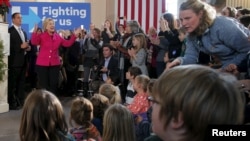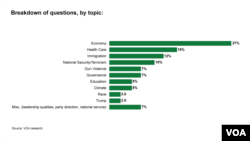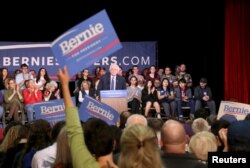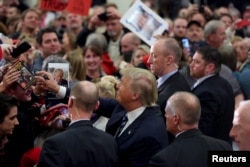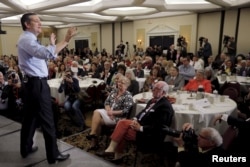“My mother works hard, harder than my father, and deserves more money,” an adolescent male told Democratic candidate Hillary Clinton earlier this week in Portsmouth, New Hampshire. “It’s not fair.”
This kind of everyday financial concern appears to be more on the minds of politically active Americans than terrorism despite the deadly attacks in Paris and California and the ensuing media coverage.
A VOA examination of questions posed to presidential candidates at campaign events in recent weeks found that the economy was uppermost in questioners' minds while terrorism was only fourth among top issues.
VOA analyzed questions posed to eight presidential contenders in four states at 14 different political events.
Twenty-seven percent of questioners posed questions about the economy, while health care accounted for 15 percent of queries — and even these questions often contained a financial or economic component.
When combined with education at 5 percent, what could be considered “bread-and-butter” issues accounted for almost half (47 percent) of questions asked of candidates in this random sampling.
“I mind very much when politicians suggest that we should retire later, we should take our Social Security later,” an elderly woman told Republican candidate Jeb Bush in Exeter, New Hampshire. “We can’t all work until we are 70.”
“What plans do you have to create better-paying jobs than minimum wage?” a man asked Democratic candidate Bernie Sanders at a town hall meeting in Red Oak, Iowa, last week. “That’s the floor. What are we going to do?"
“I’ve read your health care plan. I want to ask you more specifically about how you are going to deal with the high cost of prescription drugs,” a young man said to Republican candidate Ben Carson in Keene, New Hampshire. “If we don’t deal with prescription drugs, we are not going to be able to fix any of our health care problems.”
Immigration concerns
Immigration was the next most popular topic at 12 percent, and it drew sharp contrasts between Democratic and Republican campaign event attendees.
“I’m undocumented. I’ve been here since I was 10 years old,” a young adult Hispanic woman told Sanders in Chicago. “Honestly, I don’t live scared. I actually live really angry. How would you end the separation of families, mass deportations and mass detentions?”
“What does Congress not understand about the words ‘Illegal immigration’? They are not undocumented workers,” a man commented to Republican Chris Christie in Manchester, New Hampshire. “Someone has to solve this immigration problem. It’s destroying this country.”
“On immigration, if the government slapped some serious fines on employers [who hire undocumented workers] and have people prove their citizenship to collect welfare benefits, illegals would have no choice but to go back home,” a man told Republican Ted Cruz in Coralville, Iowa. “There would be no jobs and no freebies for them.”
National security
National security and foreign affairs, which included terrorism, accounted for only 10 percent of queries yet all eight candidates — five Republican, three Democratic — mentioned national security and terrorism in their remarks before fielding questions.
A Gallup survey in mid-December found 16 percent of Americans listed terrorism as their top concern, up from 3 percent a month earlier.
In the campaign events examined by VOA, attendees of Republican events were far more likely than their Democratic counterparts to raise the issue.
“If you become president, how are you going to get all the Muslim terrorists out of the country?” a woman asked Carson.
“When we look at the challenges we have with ISIL, it’s obvious we have to have an Arab coalition as part of the team to defeat ISIS,” a man told Republican Marco Rubio in Anderson, South Carolina. “How do we get Arab states to be a part of that coalition?”
Not all national security questions, however, dealt with terrorism. A veteran of the Vietnam War asked Christie about the need to invest more in America’s military. Hours later, at another event, Christie was asked about terrorism as it relates to another topic: gun violence.
“It may score [political] points to mention ISIS and the threats to America, but more people have been killed in America by homegrown extremists than by international terrorists,” a man told Christie. “When do we consider gun violence a credible threat to our safety and security?”
Guns, education, politics
Overall, firearms and gun safety accounted for 7 percent of questions asked.
“Where do you stand on the Second Amendment [to the U.S. Constitution on the right to bear arms]?” a woman asked Carson.
“What is your plan to make sure that me, my brothers and my friends are safe from violence at school?” a teenager asked Clinton.
Candidates of both parties were asked about the soaring costs of higher education.
“What is your position on reducing student loan indebtedness?” a young woman asked Cruz.
“I have a high school senior, a high school sophomore, and I have a sixth-grader,” a working mother asked Sanders. “You see it everywhere that kids are graduating with insurmountable [student] debt. How are my husband and I going to be able to afford this [tuition expenses]?”
The way in which America elects its leaders and governs itself also drew questions.
“Do you have any idea what can be done to reduce the huge influence of money in politics?” a man asked Democrat Martin O’Malley in Madbury, New Hampshire.
“Can we do anything in the area of money in politics? Lobbyists funding campaigns? Could we get more small donors in?” a male student asked Rubio.
Republican vs. Democrat
Political events often attract core party loyalists whose questions illustrate America’s ideological divides as sharply as the candidates’ responses. Democratic contenders often were asked to help solve a particular problem or challenge — consistent with Democrats’ traditional view of an activist government.
“My family has great health insurance,” said the mother of a mentally ill child at a Clinton campaign event. “But we still have to fight for every single admission, every single bit of treatment. As a parent with a sick child, I only have so much energy to fight this fight, and something really needs to be done.”
“I’m a full-time working mom with three small children, 6 and under,” a woman told Sanders. “After my house payment and student loans, child care is my biggest expense. Can you talk about [providing] high-quality child care?”
Attendees of Republican events were far more likely to stress self-reliance — consistent with the party's advocacy of limited government.
“I’m very concerned that, under Barack Obama, everybody’s dependent on the government, like a drug,” a man told Bush. “How are you going to change the mindset of the American people to make them get off of the government and go out and earn their living?”
“My father works very hard to put food on the table,” a teenage male told Cruz. He added that taxes support “people who don’t stand up and get a job. How do you make sure that people on welfare are actually people who need welfare and not just living off the system?”
The Paris climate pact received scant attention, with Clinton asked to comment on it, and a man telling O’Malley that agreements won’t work unless people change their energy-consumption habits.
Republican front-runner Donald Trump was the target of some derisive comments at both Democratic and Republican campaign events. But Trump, who has drawn headlines with inflammatory statements about Muslims, Hispanics and other groups, does not field questions from the audience at his campaign events, and he could not be included in VOA’s examination.




